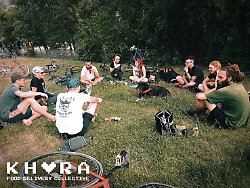A collective of bicycle couriers shows the top dogs in the delivery service industry that there is another way. Khora relies on flat hierarchies and fair working conditions. The people of Kreuzberg can afford to forego large investor funds.
A month-long dispute over the working conditions at the lightning delivery service Gorillas and the successful startup’s attempts to stop a planned works council election show how much the industry is still struggling with fixed-term contracts, a lack of equipment for drivers and poor scheduling.
The consequences it can have if a company is criticized for poor working conditions became apparent in August 2019: At that time, the British food service supplier Deliveroo announced its withdrawal from Germany. The courier driver Stefano Lombardo practically lost his job overnight, as did a number of colleagues. That’s why he set up the alternative delivery service Khora in Berlin without further ado. The company sees itself as a collective with flat hierarchies and fair working conditions.
Dana Shanti first became aware of a Khora driver in November 2019. The two started talking and exchanging phone numbers. He called her in March 2020 – the 43-year-old has been driving for Khora since then. The passionate courier driver was also employed by Deliveroo at the time and had lost her job. When the company left the German market, it was a big shock for them.
Gorillas riders haven’t defected yet
“Actually, I’m a courier driver because you don’t take work home with you. At Khora, however, it doesn’t work that well anymore because there is no employee relationship, but rather: We are Khora,” Shanti told ntv.de. What she values most about working in a collective is the independence of investors, because she prefers not to have anything to do with them. “What I like about Khora is that we’re trying to build a new social structure and not work into the pockets of great bosses.”
Former gorillas riders have not yet defected to the cooperative collective. A lot has happened since it was founded in summer 2019. There are now 15 riders riding for Khora and the collective works with 38 restaurants, mainly in the Berlin districts of Kreuzberg, Friedrichshain and Neukölln. According to the company, the delivery service carries out up to 250 orders per week. “With Khora, everything is not automatically better than with gorillas, just because we take responsibility ourselves. We don’t necessarily earn more than a gorillas driver,” says Shanti.
Unlike the competition, the riders do not receive a flat-rate hourly wage. The money that the couriers earn with the trips goes to a cooperative that distributes the money to the drivers. The couriers also have health insurance through this cooperative and can obtain unemployment and occupational accident insurance.
Competitor Wolt makes it difficult for Khora
Like many other delivery services, Khora has benefited from the corona pandemic. It only got tough for the collective when Wolt came onto the German market. Some of the drivers then switched to the Finnish company, which is also committed to fair working conditions, but pays better and is less stressful.
Unlike Lieferando, who charge the restaurants 30 percent commission, Khora rates between 20 and 25 percent, depending on the deal. In addition to the larger profit margin, the restaurants the collective works with also appreciate the idea behind Khora, according to Shanti. “The restaurants that work exclusively with us are also more alternative. Many of them offer vegan dishes and stand for an anti-capitalist idea.” But some would also work with Wolt and other providers at the same time, who would then want to be represented on as many platforms as possible.
While customers used messenger services such as Whatsapp to place their orders in the early days, Khora now uses the CoopCycle app. The application of the French digital company specializes in services for collectively organized bicycle couriers. According to Shanti, some customers become aware of Khora through the restaurants themselves. She says of her clientele: Our customers are a mixture of people who can afford it and people who stand for certain values. Compared to other food delivery services, Khora is a bit more expensive on average.
“We have never been in the red”
“Anyone who treats courier drivers like day laborers needn’t be surprised if the staff stays away first and then the customers too,” says Otto Strecker, board member of the food industry specialist AFC Consulting Group AG and honorary professor at the University of Bonn, to ntv.de. . In his opinion, however, more transparency and fair wages for the couriers and higher commissions for the catering industry do not work in the mass market. Khora will not even try to attack Lieferando in the first place and will never be able to afford it.
“The advertising battle between Lieferando, Lieferheld and Foodora alone cost 780 million euros according to research by ‘Capital’ until Lieferando finally took over the competition in 2019,” says Strecker. Rather, the business is addressing a niche: higher-quality restaurants with slightly different, more sustainable products that fit the overall concept. “This niche exists primarily in urban, enlightened milieus, but it cannot be multiplied and scaled at will.”
Even if the collective had a hard time last month. “We have never been in the red. That wouldn’t even work,” says Shanti. In the summer, for example, the wages of the riders had to be topped up from reserves so that everyone earned at least 10 euros an hour. Nevertheless, Khora is in the black. “We don’t want to go into debt. Even if that means a lot of work is being done that is not getting paid.”
